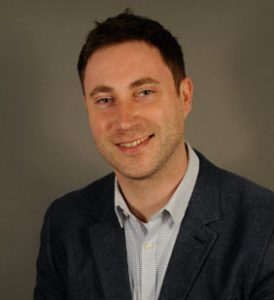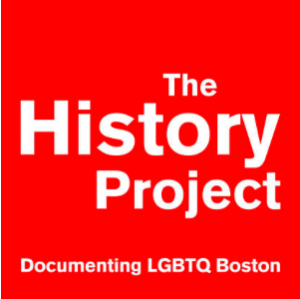
by Julia Newman
Currently serving as the Interim University Archivist and Curator of Special Collections at the University of Massachusetts Boston (UMass), Andrew Elder recognizes the importance of outreach and advocacy within the archival field. His entry into the archives was sparked by an interest in activism and the ways history is constructed through the use of archives. He explains that he lacked the personality of a conventional activist and thus found a way to fulfill his interests through involvement with archives that provided communities an opportunity to document their own stories. Andrew’s personal and academic interests lead him to Simmons College, where he completed his Master’s of Science in Library and Information Science with a concentration in Archives Management. As a professional archivist, Andrew stays engaged with his work by dedicating his free time to community archives and volunteer organizations.
After moving to Boston, Massachusetts in 2006, Andrew began working with the History Project: Documenting LGBTQ Boston through an internship. He continues to support this all volunteer organization as an archivist, member of multiple subcommittees and a co-chair of the Board of Directors. Andrew explains that the History Project’s mission is to document and preserve the history of the community, but more importantly the organization is concerned with actively sharing their archival materials with members of their community and the general public. The History Project provides free and paid public programming, and Andrew remains involved in the planning and outreach integral to such programs. He is currently working on the 2017 HistoryMaker Awards, an event he helped launch in 2009 that was held on October 11, 2017. Andrew’s involvement with this event also includes script writing, design work and the never-ending struggle to balance the politics and mission of the organization. For some, his involvement with this organization would be enough to constitute a full-time position, but yet Andrew manages to find time for this work beyond the many requirements of his current position at UMass Boston.

In August of 2017, Andrew transitioned from Digital Archives and Outreach Librarian to the Interim University Archivist at UMass Boston. This move required that Andrew shift some of his duties to other colleagues, but he continues to engage in outreach and advocacy in his current position. Although his average day now includes managing his department and attending meetings about library wide initiatives, Andrew continues outreach work through face to face donor visits and advocacy efforts in fundraising strategy sessions. Further, Andrew is also involved in the Mass. Memories Road Show, a digital history project supported by UMass Boston that offers communities throughout Massachusetts an opportunity to bring in photographs to be digitized and compiled into an open archive. This program demonstrates the services archives can offer to communities wishing to document their own history. In reference to community projects, Andrew understands the significance of remaining respectful of a community’s right to establish their own archive separate from formal institutions. Archives should work to support community organizations or archives through outreach and advocacy without imposing on these communities.
For Andrew, outreach and advocacy remain part of his personal and professional involvement with the archives. He stresses the importance of being an archivist that talks about archives in order to communicate the value of archival institutions, and to persuade others to see the value in their potential contributions to archives. Andrew views archival work as a public service for it also allows individuals the chance to gather more information about something new. Andrew explains that successful public programming surrounding the archives should allow for discovery, but should also be entertaining in order to hold attention and increase engagement. In outreach development, Andrew also states the value in communicating with other professionals in the field. He recognizes that archivists and other information professionals face numerous pressing issues on a daily basis, but reiterates the importance of a commitment to outreach and advocacy within archival work. This includes creating regular content, maintaining social media, working with volunteers and fundraising. Largely, Andrew encourages more individuals in the archival field to look beyond the archive for outreach and advocacy opportunities.
Within the archival and larger information field, Andrew demonstrates the capacity of archivists to support outreach and advocacy work in their professional and personal lives. Although Andrew maintains a busy work life at UMass Boston, he continues to dedicate his time and energy to community-led archives and programs. He is certainly doing as much as he can to advocate for archives and demonstrate respectful outreach work.
